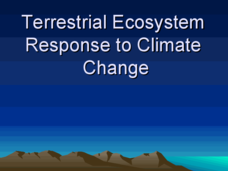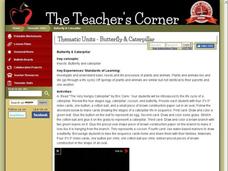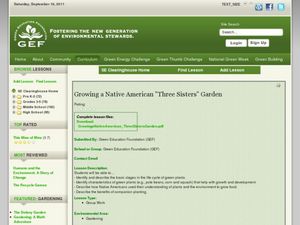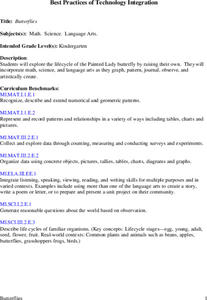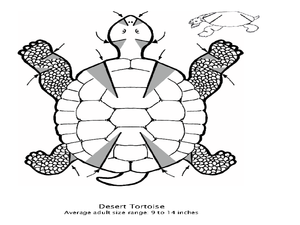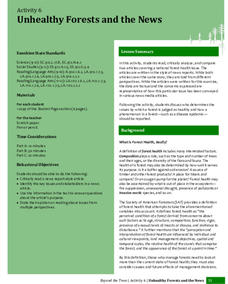Curated OER
Why Are Bees Important?
Students identify and analyze pollination and how bees play an important part in the life cycle of flowering plants. They also identify the process of plant pollination and how bees play an important part in the life cycle of flowering...
Curated OER
Plant Inspection Lab
In this IPM inspection worksheet, students complete a chart observing the phenological events that are observed at each stage of various plants' development.
Curated OER
Terrestrial Ecosystem Response to Climate Change
An extensive investigation of the Earth's climate changes awaits your environmental science classes. This top-notch presentation begins by looking at the history of Earth's climate and then predicts the impact on each major terrestrial...
Curated OER
Finding, Gathering, Saving Seeds
Students understand the importance of saving seeds. For this saving seeds lesson, students dry out seeds for later use planting. Students recognize that one plant may have many seeds.
Curated OER
What's Happening to Our Caterpillars?
Seventh graders participate in a instructional activity making observations of caterpillars. They identify different changes in the life cycle of a caterpillar and also understand the final result of the life cycle ending.
Curated OER
City Wildlife in a Vase
Learners examine a still-life painting. They discuss the observation of nature by scientists and artists and explore the symbolism of biological life cycles depicted in a painting.
Curated OER
Flower Power
Students investigate and explain the basic needs and life processes of plants. Key concepts include: living things change as they grow and need food, water, and air to survive. The reverse of the Kansas quarter serves as inspiration.
Curated OER
Web of Life Game: Trout
Students explore the concept of food webs. In this food web lesson, students demonstarte the connection between species. Students use a ball of string show how the food web works, then have a class discussion.
Curated OER
Swimming With the Crabs!
In this environmental science learning exercise, students complete a graphic organizer (Frayer model) on blue crabs. They write an article using the given facts.
Curated OER
The Tiny Seed Lesson Plan Guide
Not only is this instructional activity about story retell, main events, and making predictions, it's also about plants. Youngsters will read the tale, The Tiny Seed as they explore the plant life cycle and early literacy skills. The...
Curated OER
Creature Features
Students examine why certain animals live in only specific places throughout the world. Using animals, they classify them based on their characteristics and identify their basic needs. They also observe and compare the life cycles of...
Curated OER
Butterfly and Caterpillar
Pupils listen to the story "The Very Hungry Caterpillar" and create their own "Very Hungry Caterpillar" book to learn the life cycle of a butterfly.
Curated OER
Inside the Egg, Hatching Chickens
Pupils conduct an egg candling activity to show the life inside a fertile egg. Students discuss the needs the egg has of the hen, as well as similarities and differences between plants and animals. Pupils complete a life cycle wheel...
Curated OER
Getting a Handle on Your Bee
Students observe dried bees, carefully glue them to toothpicks, and use them for cross pollinating their Brassica plants. They also describe reasons why two similar investigations can produce different results. Finally, students...
Curated OER
The Mechanisms of Decay and Decomposition
Eighth graders study how all living things die. They are introduced tot he life cycle and the concept of an ecosystem. Students have a introductory exposure to trophic levels (producer-consumer-decomposer) in the environment.
Curated OER
Flutterings and Flowers
Fourth graders investigate the significance of natural resources and the habitats of butterflies. They create a list of their own favorite foods, then watch a video about habitats. Students identify things in the video that animals and...
Curated OER
Growing a Native American "Three Sisters" Garden
Young scholars explore plant life by creating their own gardens in class. In this food growing lesson plan, students discuss the types of gardening methods Native Americans used in order to keep healthy. Young scholars plant corn seeds...
Curated OER
What Beautiful Caterpillars!
Second graders investigate the life cycle of the caterpillar. They create a caterpillar habitat and care for it. Students make daily observations that are recorded in a writing journal. During the process of observation the students...
Curated OER
Butterflies
Students will explore the life cycle of the Painted Lady butterfly by raising their own. They will incorporate math, science, and language arts as they graph, pattern, journal, observe, and artistically create.
Curated OER
Diamond Terrapin Fun Facts
In this animal worksheet, students complete 6 pages of activities and exercises pertaining to the diamondback terrapin. Students read about the life cycle, study habitat maps and color and cut out a three dimensional turtle.
Chicago Botanic Garden
Seasons of a Plant
The third in a series of six lessons is an engaging three-part activity defines that discusses phenology, focusing on the cyclic seasons of plants. Pupils then observe phenology outside before determining how climate change can...
Curated OER
More Lizard Snacks
Students listen to Chapter I, Chapter II, Chapter III, and Chapter IV of "The Forgetful Pony". They observe different stages of development of mealworms. The student sequences pictures to show the life cycle and draws the developmental...
University of Florida
Unhealthy Forests and the News
Everyone knows a tree makes a sound when it falls, but what do we know about dying trees? Class members learn background information about Laurel wilt disease from a teacher-led presentation. Team members work with partners to read and...
Curated OER
A Study of Your Domestic Water Supply
Young scholars create a diagram that traces the path of a raindrop from its source into the water supply for their house and back to the environment. They also diagram the processes that occur in a sewage treatment and water treatment...
Other popular searches
- Flowering Plants Life Cycle
- Seed Plants Life Cycle
- Plants and Animals Life Cycles
- Life Science Plant Life Cycles
- Tomato Plants Life Cycle
- Plants Life Cycles




